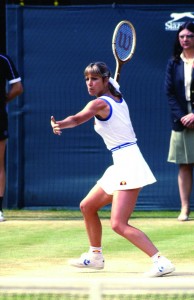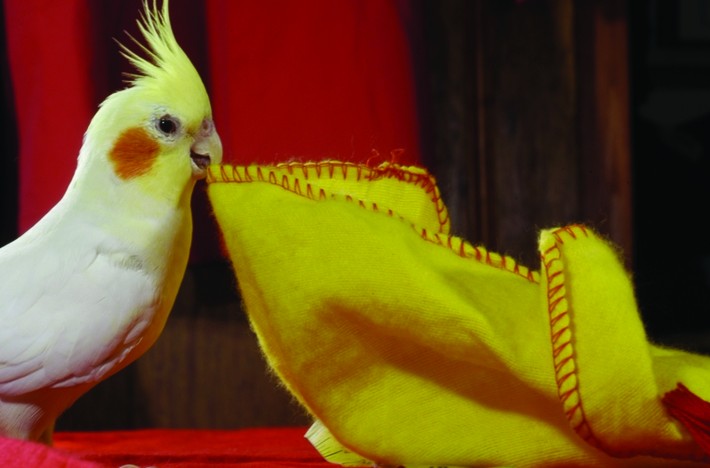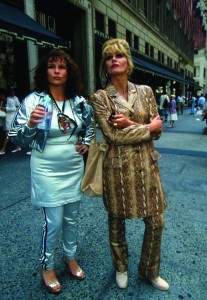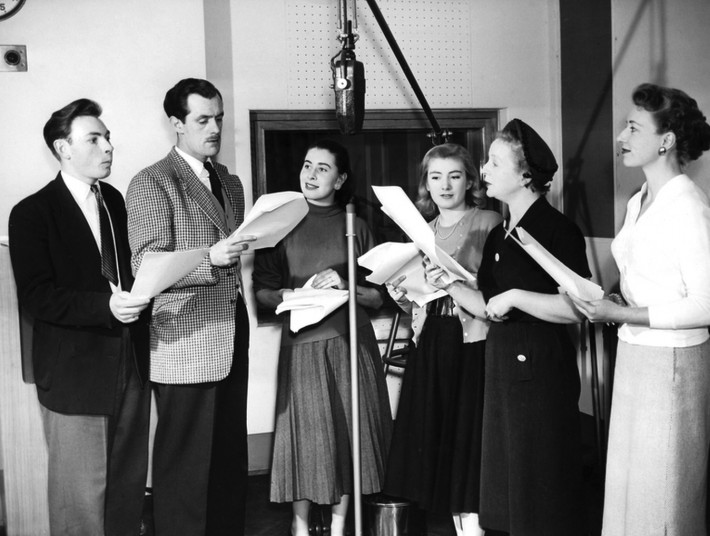Jake Berger from BBC Archive Development explains how the corporation’s extensive archive is helping trigger reminiscences in people with dementia.
In BBC Archive Development our mission is to make as much of the BBC’s archives available to as many people as possible. The immense volume and variety of the archives, and the many complexities surrounding the rights, ownership, editorial and legal sensitivities, and possible access models, means we have needed to carefully prioritise which material is made available, and to who. Our approach has been to prioritise those audiences who would benefit most from access to sections of our archives, and then set up projects to provide them with access. One recent example of this approach is RemArc, a project aiming to help people with dementia through the use of archive material.
Dementia

Martina Navratilova in the 1982 ladies Wimbledon Final. Image courtesy of BBC.
There are around 800,000 people with dementia in the UK and the disease costs the economy £23 billion a year. By 2040, the number of people affected is expected to double. Dementia involves the loss of short-term memory and is a serious problem for the person, their family and carers. Among other symptoms, dementia affects the ability to communicate. Without good communication, carers are left to infer intention and meaning from a person’s behaviour. Good communication is vital to building positive relationships between people with dementia and their carers. Positive relationships in turn can lead to the person with dementia living a more fulfilled and enjoyable life, and to receiving a better level of care. As a result, finding ways to improve communication becomes very important.
A number of years ago we were approached by Dr Norman Alm from the University Of Dundee. Dr Alm, along with Dundee colleagues and others from the University of St Andrews, had spent a number of years looking at how technology could be used to help people with dementia, their carers and families.
Reminiscence
Dr Alm’s team had undertaken lots of research into ‘reminiscence’. The principle of which is to assist people who have dementia to interact and converse in a natural way by stimulating their long-term memory with material from the past. It is often the case that long-term memory can still function when the person’s short-term memory is degraded. Typically, people with dementia’s strongest memories are from when they were aged between 14 and 40, and tapping into long-term memory can make it possible once again for people with dementia to enjoy interacting with others, through their stories and memories. Interestingly, the research showed that ‘generic’ material, i.e. images and audio/video that are not personal, was more effective at eliciting a reminiscence response than, for example, family photographs.

Baggio the parrot from BBC One’s Test Your Pet, 2004. Image courtesy of BBC.
RemArc
After meeting Dr Alm and hearing about his research we decided we would design and build an online tool to serve archive content for use in reminiscence work: a ‘reminiscence archive’, which we call BBC RemArc (bbc.in/remarc). RemArc contains around 1,500 items from the BBC Archives, including around 250 video clips, 250 audio clips, and over 1000 images. The material ranges in date from the 1930s to the 2000’s with much of the material having never been made available to the public. Virtually none of it has been seen for many decades. You can explore items by decade or by themes such as ‘TV and radio’, ‘sport’ and ‘animals’, and it works on any browser, but is optimised for use on tablets and other touchscreen devices.

Jennifer Saunders and Joanna Lumley in Absolutely Fabulous. Image courtesy of BBC.
We wanted to achieve a number of things with RemArc. Firstly, we wanted to use BBC archive material to benefit our audience members who have dementia, their families and their carers, and we are confident that among the 1,500 items available there will be something that triggers reminiscence for everyone. Secondly, wanted to demonstrate that it isn’t just the famous shows and well known historical events captured in the BBC’s archives that are of value: sometimes a minor detail in the background of a photograph or film clip might mean something significant to someone. And thirdly, we wanted to ensure our work benefits the greatest number of people. RemArc is available for free across the world and is licensed for non-commercial use and reuse. In addition, RemArc software will soon be available for free under an open source license, so people can build their own reminiscence archives with new languages and culturally appropriate content.
But does it actually work?
I’m sure many people reading this will have spent large amounts of time and effort working on projects, never quite sure whether the end results would actually be worthwhile. I wanted to see whether RemArc was actually effective. Would people with dementia and their carers use it? Would they enjoy it? And most importantly, would the material trigger reminiscences, and would the people with dementia talk about those reminiscences?
The Alzheimer’s Society has been very supportive of RemArc from the outset, and they very kindly arranged for me to visit six of their Service User Review Panels (SURPS) around the country. SURPS groups are made up of between five and 15 people with dementia who come together, for example, to review whether a new public building is ‘dementia-friendly’, or in my case, whether a new website for people with dementia was any good, and what could be done to improve it.

The Hood family from The Archers, Image courtesy of BBC.
I must confess to being a bit nervous at my first SURPS session. However, within a couple of minutes of handing out the iPads to people in the assembled group, I breathed a huge sigh of relief. They could use RemArc. They did seem to be enjoying it. And the archive content was triggering long-term memories, and reminiscences and conversations were beginning to emerge. These trial sessions are usually supposed to last for around 20 minutes, but I usually had to ask people to stop using RemArc and return the iPads after about an hour, which was surely a good sign.
Here are some quotes from these sessions, which give an idea of the response:
- It takes you back to what you used to do.
- It gets you going - your long-term memory.
- Makes you realise how much you thought you’d forgotten.
- It inspired conversations about a great many random things…I could have spent a few hours.
- We remembered so much about the past yet we are here because we have failing memories.
What next?
During six SURP visits I observed 52 people with dementia using RemArc, providing me with a huge amount of valuable feedback and suggestions for improvements, all of which are captured and many of which are currently being incorporated in an updated version of RemArc, which will be available towards the end of 2016. At the same time the media will be made available for reuse and the software will be open sourced.
I hope that RemArc continues to be used by people with dementia and their carers, and is promoted by the many charities and organisations that perform valuable work. I also hope that people who don’t have dementia will continue to enjoy looking through the 1,500 or so items from the BBC’s archives, many of which haven’t been seen for decades.
Jake Berger
To find out more, visit: http://bit.ly/2ko1ntF or email jake.berger@bbc.co.uk.